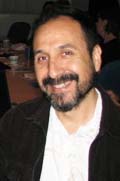
|
Stephanie Assmann is a lecturer at the Center for the Advancement of Higher Education at Tohoku University in Sendai, Japan. She holds a PhD in Japanese Studies from the University of Hamburg, Germany. Her publications include 'Value Change and Social Stratification in Japan: Aspects of Women's Consumer Behavior' (Institute for Asian Affairs Hamburg, Germany in 2005) and 'Japanese Women's Magazines. Inspiration and Commodity' (Ed. Peter Matanle. Electronic Journal of Contemporary Japanese Studies 2003).
|

|
Valerie H. Barske is an Assistant Professor of History specialising in East Asia at the University of Wisconsin, Stevens Point. She received her PhD from the University of Illinois Urbana-Champaign in 2009. Her dissertation is entitled Performing Embodied Histories: Colonialism, Gender, and Okinawa in Modern Japan. In 2005–2006, Barske was awarded a Fulbright-Hays Doctoral Dissertation Fellowship to conduct research as a Foreign Visiting Scholar at the University of the Ryukyus in Okinawa, Japan. As a Blakemore Foundation Fellow at the Stanford Inter-University Center for Intensive Japanese Studies in Yokohama 2001–2002, she had the distinct honour of working with Kodama Kiyoko, studying Okinawan dance traditions and researching embodied archives of performance with the Tokyo Okinawa Performing Arts Preservation Society. |

|
Mick Broderick is Associate Professor and Research Coordinator in the School of Media, Communications & Culture at Murdoch University, where he is Deputy Director of the National Academy of Screen & Sound (NASS). His major publications include editions of the reference work Nuclear Movies (1988, 1991) and, as editor, Hibakusha Cinema: Hiroshima, Nagasaki and the Nuclear Image in Japanese Film (1996, 1999). Two co-edited anthologies are forthcoming in 2010: Interrogating Trauma: Arts & Media Responses to Collective Suffering (Routledge) and Trauma, Media, Art: New Perspectives (Cambridge Scholars Press). A digital media producer, curator of film programs and material culture exhibits, Broderick's curated and production works include the 50-minute drama Fugue (2008: executive producer/actor), the digital diptych Exhale (2007) and touring cold war material culture exhibit Atomicalia (Japan 2009-2010). His scholarly writing has been translated into French, Japanese and Italian. |

|
Jenny Huberman received her PhD in Anthropology from the University of Chicago in 2006. She is an Assistant Professor of Anthropology at the University of Missouri-Kansas City. Her research focuses on tourism, childhood, and consumption. She is currently working on a book manuscript entitled, Ambivalent Encounters: Children, Tourists and Locals along the Riverfront of Banaras. |

|
Robert Jacobs is an associate professor at the Hiroshima Peace Institute of Hiroshima City University. He is a historian of the culture of science and technology working on issues of nuclear culture and American exceptionalism. He is sole author of The Dragon's Tail: Americans Face the Atomic Age, published by the University of Massachusetts Press in 2010, and editor of Filling the Hole in the Future: Art and Popular Culture Respond to the Bomb in the US and Japan, published by Lexington Books in 2010. |

|
Akiko Naono is Associate Professor in the Graduate School of Social and Cultural Studies, University of Kyushu. Professor Naono received her PhD in sociology from the University of California, Santa Cruz, and now teaches sociology and cultural studies at the University of Kyushu, Japan. Her publications include: Genbaku no E to Deau [Encountering the Atom Bomb Drawings by Survivors], Tokyo: Iwanami Shoten, 2004; 'Memory of absent grandpa,' in Beyond the Frame: Women of Color and Visual Representation, ed. Angela Davis and Neferti Tadiar, New York: Palgrave Press, 2005, pp. 107–29; 'Producing sacrificial subjects for the nation: Japan's war-related redress policy and the endurance doctrine,' in Toward a Trace in the Social World, ed. Macarena Gómez-Barris and Herman Gray, Minneapolis: University of Minnesota Press (forthcoming). |

|
Steve Rabson is Professor Emeritus of East Asian Studies at Brown University. He was stationed in Okinawa during 1967–68 as a US Army draftee. After completing a PhD. in Japanese literature at Harvard in 1979, he published Okinawa: Two Postwar Novellas (Berkeley, CA: Institute of East Asian Studies, University of California, Berkeley, 1989, reprinted 1996), translations of fiction with commentary. His book Righteous Cause or Tragic Folly: Changing Views of War in Modern Japanese Poetry (Ann Arbor: Center for Japanese Studies, University of Michigan, 1998) is a study of literary and cultural history. Southern Exposure: Modern Japanese Literature from Okinawa (Honolulu: University of Hawaii Press, 2000) is an anthology of fiction and poetry in translation co-edited with Michael Molasky. His current research is on the Okinawan diaspora in greater Osaka. |

|
Miyume Tanji is a Research Fellow at the Centre for Advanced Studies in Australia, Asia and the Pacific (CASAAP) and the Centre for Human Rights Education at Curtin University of Technology in Perth, Western Australia, where she also teaches International Relations. Miyume's current research focuses on the communities living with US military bases and on transnational social movements, especially those in Okinawa and Guam. Among her publications is Myth, Protest and Struggle in Okinawa (Routledge 2006). |

|
Antonio Traverso is Senior Lecturer in Film Studies in the School of Media, Culture and Creative Arts at Curtin University, Perth, Australia. He was born in Santiago, Chile, where he studied philosophy in the early 1980s and has lived in Australia since 1987. Traverso has published essays on political world cinema and in 2009 he was co-editor (with Suvendrini Perera) of a special issue of Social Identities: Journal for the Study of Nation, Race and Culture, titled Living Through Terror: (Post)Conflict, (Post)Trauma and the South. In 2010 he co-edited (with Mick Broderick) two book anthologies: Interrogating Trauma: Arts & Media Responses to Collective Suffering (Routledge) and Trauma, Media, Art: New Perspectives (Cambridge Scholars Press). Currently, he is working on a monograph about post-dictatorship Chilean cinema. As a film practitioner, he has written, directed and produced several short experimental and documentary films. Traverso was co-convenor of the Interrogating Trauma: Arts & Media Responses to Collective Suffering conference, held in Perth in 2008. |

|